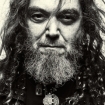Revolver has teamed with Dark Angel for exclusive "Combat Camo" vinyl reissues of the thrash band's classic albums Leave Scars and Time Does Not Heal, limited to just 200 of each worldwide. Order yours before they're gone!
The mid-Eighties glory days of American thrash metal produced some of the most legendary heavy music in history — what it failed to produce, however, were a lot of long-term success stories and happy endings. For each Big 4 behemoth, there are many more highly influential bands and notable players that have faded into obscurity.
Over the years, nearly every act has been dealt a significant blow or suffered some unthinkable disaster. From the tour bus crash that killed Metallica's Cliff Burton in 1986 and the 1989 shooting that left Possessed singer-bassist Jeff Becerra paralyzed to Exodus singer Paul Baloff's death following a stroke in 2002 and Slayer's Jeff Hanneman succumbing to alcohol-related cirrhosis in 2013 — Eighties thrash bands have experienced more than their fair share of tragedies.
Gene Hoglan counts himself among the lucky few that have made it through relatively unscathed. "I do feel like I've had a very charmed existence," says the drummer, who began his professional career as the thunderous backbone of Dark Angel and has since enjoyed success with Testament, Death, Strapping Young Lad, Dethklok and numerous other outfits.
"I always land on my feet — that's just a given for me," he continues. "I recently learned what the term 'visualization' means — like when you think of something you want and figure out a way to make it happen. I always thought it was like some hippy or new-age bullshit, but once someone explained it to me, I realized that that's what I have been doing my entire life and career."

Dark Angel's career path, however, was somewhat less charmed than Hoglan's. The underground speed-metal community took an instant liking to the five-piece from Downey, California, when their debut album, We Have Arrived, was issued via the Azra/Metalstorm label in March 1985. In September of that year, the band was approached by Combat Records, which had already released Megadeth's debut, Killing Is My Business… And Business Is Good!, the Savatage EP The Dungeons Are Calling and Oz's Fire in the Brain. Hoglan and his bandmates jumped at the opportunity to sign with Combat, and immediately went to work recording their label debut, the 1986 thrash classic Darkness Descends.
While the group's popularity continued to rise as they spent the next few years touring with other Combat bands and releasing such impactful records as Leave Scars (1989) and Time Does Not Heal (1991), it was never quite smooth sailing for Dark Angel. While Hoglan remained the group's linchpin, the rest of the lineup was in a constant state of flux. Band members left suddenly for "nebulous" reasons (or sometimes no reason at all), and despite being recognized among the great thrash bands of the Eighties, Dark Angel never made its one definitive album: its Reign in Blood, Seven Churches, Master of Puppets or Bonded by Blood. By 1992, Dark Angel was no longer in flight.
Below, Hoglan revisits Dark Angel's early years, and walks us through the band's tumultuous rise and frustrating fall.
WAS DARK ANGEL ACTIVELY SHOPPING FOR A NEW RECORD DEAL WHEN THE BAND WAS APPROACHED BY COMBAT RECORDS IN THE MID EIGHTIES? DID OTHER LABELS EXPRESS INTEREST IN SIGNING THE GROUP?
GENE HOGLAN I don't think we were active at all in terms of shopping for a deal, and I don't recall any of the other labels at the time — Metal Blade, Megaforce, etc. — expressing interest in Dark Angel. But at the time, Combat Records was one of the premiere underground metal labels, so it made sense that we would want to sign with them.
DARKNESS DESCENDS IS LARGELY CONSIDERED THE ALBUM THAT PUT DARK ANGEL ON THE MAP AND A CLASSIC ALBUM FROM THRASH'S GLORY DAYS. WHEN YOU LOOK BACK ON IT NOW, HOW DO YOU VIEW THAT RECORD?
Aside from being in the studio a few times while my friends were recording albums — I was there during the recording of Slayer's Show No Mercy and even sang backup vocals on "Evil Has No Boundaries" — I had never spent much time in a studio before we did Darkness Descends. I was an 18-year-old kid with a whole lot of energy who thought he knew what he was doing, but totally didn't. On that record, I was woefully un-tight. And we certainly did not have a great guitar sound on the album. We actually slowed down drastically when we recorded Darkness Descends. We were much faster before that — because I believed that you needed to really feel it to be at your best, and unless you were playing as fast as you can, you probably weren't really feeling it. I just didn't have the proper philosophies back then.
So Darkness Descends is just a challenging album to listen to, from my standpoint. I appreciate that people enjoy it and I'm grateful that it has kept up its reputation over the years, but it's not an easy album for me to listen to.
1986 WAS CERTAINLY AN IMPORTANT YEAR FOR THRASH METAL, WITH RELEASES LIKE METALLICA'S MASTER OF PUPPETS, MEGADETH'S PEACE SELLS… AND SLAYER'S REIGN IN BLOOD. WAS IT TOUGH FOR DARK ANGEL TO BE COMPARED TO THESE AND OTHER BANDS WHO WERE PUTTING OUT SOME OF THE GREATEST RECORDS OF THE DAY?
What's that old quote? "For all sad words of tongue and pen, the saddest are these, 'It might have been.'" [Laughs] If Darkness Descends had come out in August or September instead of November 1986, perhaps things would have been slightly different. Maybe more people would have said, "Hey, this band is pretty cool," instead of, "Well, we had Reign in Blood last month, and everything sucks after that." [Laughs] People were pretty ruthless back then — they would call us "Slayer babies" and things like that.

ORIGINAL SINGER DON DOTY LEFT THE BAND SOON AFTER THE RELEASE OF DARKNESS DESCENDS. WHEN DID THE PROBLEMS WITH HIM BEGIN TO SURFACE?
I guess it started before we began recording the album — sometimes it was a challenge just to get him to rehearsals. But back then I was very naive when it came to drugs and other ancillary activities that one might be involved in — it wasn't a part of my life, so I didn't really pay attention to things like that. So I didn't think we had many problems as a band, but it started to become more obvious between the release of the record in November 1986 and the start of the tour with Possessed in January 1987. And obviously, the real sign that something was wrong was when he backed out of the tour just a few days before the first date, which forced us to hire Jim Drabos to replace him.
DID DON RETURN AFTER THE TOUR WITH POSSESSED?
When we got home, I was just expecting for us to carry on with Jim, but his feeling was that he had always wanted to go out on tour and now that he had done that, he didn't want to do it anymore. So he quit and eventually became a police officer. During this time, [guitarist] Jim Durkin had stayed in touch with Don a little bit, and it looked like Don was kind of getting his act together. We talked about getting back together with Don — but it just never worked out. We tried, we gave it a few months, but we ultimately decided that we had to move in another direction.

WHAT WAS IT ABOUT RON RINEHART THAT MADE HIM THE BEST REPLACEMENT FOR DON?
I just felt that Ron had a real strong voice and he looked cool and he could fight, which was always helpful. He was the only guy I knew who had sleeves of tattoos, which wasn't very common among thrash metal singers back then. To be honest, I felt that the vocals on We Have Arrived were horrible — just bland and boring and it sounded like Don was singing through his nose. So I had no problem not having that voice in the band anymore, and it gave us a shot to get somebody powerful. Ron just had a way better attitude too — he wanted to work and he dove right into the deep end with us, he didn't just stick a toe into the water.
DARK ANGEL'S FIRST RECORD WITH RON WAS 1989'S LEAVE SCARS, WHICH WAS NOT ONLY A MAJOR STEP UP FOR THE BAND IN TERMS OF SONGWRITING, BUT ALSO INTERESTING BECAUSE IT FEATURED TWO INSTRUMENTALS AND A COVER OF LED ZEPPELIN'S "IMMIGRANT SONG." DO YOU REMEMBER WHY THE BAND CHOSE TO INCLUDE "IMMIGRANT SONG" ON THE ALBUM
"Immigrant Song" was actually the first song we played together as a band with Ron. He had come to a Dark Angel rehearsal to check us out and we wanted to meet him and hang out for a bit and all that. I think we played him some of the new stuff that we were working on, as well as a few songs off Darkness and We Have Arrived. But obviously he didn't know those songs so he couldn't jam with us — then one of the guys asked him if he wanted to play a cover song with us so that we could hear his voice. We kicked around a few songs and finally landed on "Immigrant Song" as one that we all knew, and eventually we recorded it for Leave Scars as a little homage to the first song we ever played together.
LEAVE SCARS WAS WRITTEN ALMOST ENTIRELY BY YOU AND JIM DURKIN, WHEREAS DARKNESS DESCENDS FEATURED MORE OF A MIXED BAG OF WRITERS.
Well, to be honest, the "mixed bag" of other writers on Darkness Descends was more like a riff here and there. Eric Meyer wrote a riff on "The Burning of Sodom," so we gave him credit. Eric also got credit for writing something in "Death Is Certain (Life Is Not)." But I can guarantee you that that was me, Jim and [bassist] Rob Yahn who wrote that song and Eric just had an idea for how to start off the song. But back then I didn't really know much about songwriting credits and all that.
JIM HAD BEEN IN THE BAND SINCE THE BEGINNING AND ENDED UP LEAVING SUDDENLY DURING THE LEAVE SCARS TOUR IN '89.
That's right, we were on tour with Death when that happened. It's a rather nebulous story, and I've never really gone into it with Jim, but there was something going on in his life that mandated that he pretty much leave the tour right this minute. He never came to any of us and said what was going on, and I admit that I wasn't the happiest about it at the time. But Jim was my brother and my friend. And not long after he left, we got in touch with each other and talked, and I told Jim that I just wanted him to be happy. But we've never really spoken about why he left — there are details there that I don't need to know.
THE FINAL RECORDING FOR DARK ANGEL WAS 1991'S TIME DOES NOT HEAL. WHAT ARE YOUR THOUGHTS ON THAT ALBUM TODAY?
The truth is that all Dark Angel albums are hard for me to listen to, and that's because I'm just so invested in them. Time Does Not Heal is a crazy one. It received a lot of vilification from the Darkness Descends fans, and that's understandable because I ended up becoming the primary songwriter in the band now that Jim was gone, and I have a different style of writing than Jim. So it made sense that the album sounded different from Darkness Descends.
I wrote all the vocal lines for the album, and Ron did his best to take the ideas I gave him and run with them, but a lot of people just hated the vocals on that record. They thought there was too much singing and not enough aggression and all that. But the vocal lines sounded cool to me. And I was a huge Candlemass fan at the time, and Messiah Marcolin was definitely an influence on the vocal lines for Time Does Not Heal.
Some of the reviews were incredible, even if some of the fans didn't like it, but that doesn't mean anything. I think Kerrang! gave it five out of five Ks and basically said it was the greatest record since Metallica's …And Justice for All and that it was going to completely propel this band to the next level. So some people like the album and some people don't, but it's all good to me.












